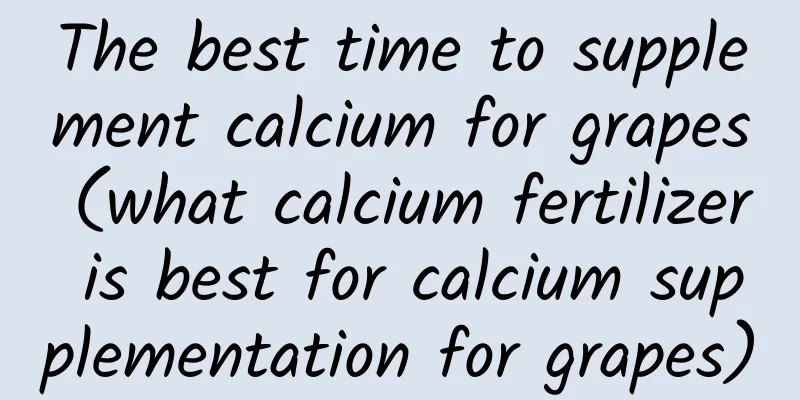The best time to supplement calcium for grapes (what calcium fertilizer is best for calcium supplementation for grapes)

|
In agricultural cultivation, calcium is a trace element used in relatively large quantities, second only to nitrogen, phosphorus and potassium. Therefore, some people call calcium the "fourth major element." In grape cultivation, calcium is also one of the more critical elements. It is related to the yield and quality of grapes, and its importance is self-evident. Calcium requirements of grapesCalcium is a nutrient that grapes require in relatively large quantities. In particular, many soils contain relatively low amounts of calcium, so artificial fertilization is needed to supplement the grapes' need for calcium. Generally speaking, producing 1,000 kg of grapes requires 6.7 kg of nitrogen, 7.5 kg of potassium, 4.0 kg of calcium and 2.1 kg of phosphorus. It can be said that grapes' demand for calcium is even greater than their demand for phosphorus. This shows the importance of calcium to grapes. The role of grapes in calcium supplementation1. Promote the transmission and absorption of nutrients, increase fruit enlargement and sweetness. 2. Increase the toughness of the fruit peel and reduce the occurrence of diseases such as fruit rot, fruit cracking, and sunburn. 3. Promote coloring, increase fruit powder, and improve the appearance of grape fruits. 4. Improve the stress resistance of grapes and reduce the occurrence of diseases and pests. When to supplement calcium for grapesCalcium supplementation for grapevines is a process throughout the entire growth period and can be specifically divided into three stages. From budding to fruiting The calcium demand during this period accounts for about 40% of the whole year, which is to lay a good foundation for the grapevine to bloom and fruit. From fruit setting to hard core stage The calcium applied at this time accounts for about 30% of the annual amount, mainly to promote the development of the fruit peel, resulting in thick leaves, developed root system, strong growth and strong disease resistance. From the hard core stage to the coloring stage This is the peak period for calcium supplementation for grapes. Although the time is short, the demand is relatively large. It is mainly to increase the yield. The skin can be thickened and the fruit cracking can be reduced; the fruit stalks can be thickened and the grains will not fall off; the leaves can be healthy and will not age prematurely. Grapes as a calcium supplementIncrease the use of organic fertilizer Organic fertilizer contains various nutrients and can improve soil conditions and regulate soil pH. Fertilizer flushing Flush application of trace elements is the simplest and most direct way. Combined with the application of organic fertilizer in autumn, apply 1 to 2 kg of calcium nitrate to each fruit tree. In March, before the first peak of root growth, apply 0.25 kg of superphosphate to each tree. Foliar spray In addition to flushing, calcium can be supplemented by foliar spraying in the early growth stage of grapes, the young fruit expansion period and one month before harvest. This method is faster and more effective. |
<<: Why do leeks grow thinner and thinner? (Why do leeks grown at home grow smaller and smaller?)
>>: What fertilizer is best for growing ginger (what organic fertilizer is best for growing ginger)
Recommend
Peanut cultivation technology
Peanut is an important economic crop with high nu...
How to grow Chlorophytum comosum so that it blooms
Chlorophytum comosum flowering time Chlorophytum ...
Cultivation methods and precautions of peacock grass
How to grow peacock grass illumination Mauve is a...
What are the plants of Oleaceae?
1. Forsythia Forsythia belongs to the genus Forsy...
Which one is easier to keep, the fiddle-leaf fig or the bird of paradise? Is it easier to keep it indoors?
The fiddle-leaf fig belongs to the genus Ficus in...
How to make bonsai with osmanthus
Bonsai Making Source The materials for osmanthus ...
Complete steps and maintenance methods of hydroponic cultivation of dragon blood tree
Hydroponics steps 1. Select a dragon blood tree w...
Cultivation method of cilantro
Soil environment Garden soil is mixed with river ...
Bean types
1. Lentils Lentils are a very common type of bean...
How to make a pagoda-shaped bonsai of lucky bamboo
Choose Lucky Bamboo Lucky bamboo grows healthily,...
Cherry Blossom Tree Growth Environmental Conditions and Characteristics
Cherry Blossom Tree Growth Environmental Conditio...
When should cabbage be planted?
Chinese cabbage is a common vegetable on the tabl...
How to cut off the yellow leaves of the green radish
1. Slight yellowing It is normal for the plant to...
How to prune Osmanthus fragrans
When is the best time to prune Osmanthus fragrans...
How to grow spinach on the balcony
1. Planting season: Spinach can be sown in all se...









